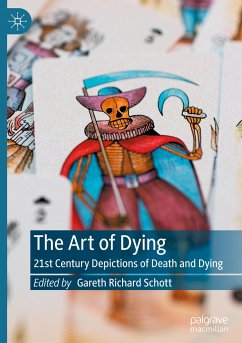The Art of Dying: 21st Century Depictions of Death and Dying examines how contemporary media platforms are used to produce creative accounts, responses and reflections on the course of dying, death and grief. Outside the public performance of grief at funerals, grief can strike in anticipation of a loss, or it can endure, continuing to interject itself and interrupt a permanently changed life. This book examines the particular affordances possessed by various contemporary creative forms and platforms that capture and illuminate different aspects of the phenomenology of dying and grief. It explores the subversive and unguarded nature of stand-up comedy, the temporal and spatial inventiveness of graphic novels, the creative constructions of documentary filmmaking, the narrative voice of young adult literature, the realism of documentary theatre, alongside more ubiquitous media such as social media, television and games. This book is testament to the power of creative expressionto elicit vicarious grief and sharpen our awareness of death.








